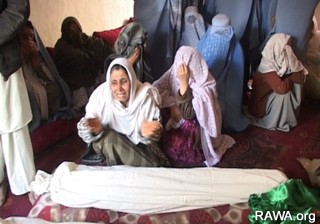By David Loyn
Kabul: After two years in which the violence in Afghanistan has become worse, it is hard to see signs of hope in 2008.

A mother, who lost three sons in the blast, cries on their dead-bodies. She says: "I sent my children to school to get education, not to be used for welcoming MPs."


The UN called 2007 the bloodiest year in Afghanistan since 2001. (AP photos)
The detailed new international commitments, and promises of more money, put forward at the London Conference in January 2006, made little headway as the war against the Taliban went into a new phase.
In the south, mainly British and Canadian forces have sustained far more casualties during this period than earlier, as they have fought for control of the Pashtun heartland.
In the east, US forces have been trying to contain the insurgency in the giant White Mountain range, hampered by a porous border to the Taliban recruiting grounds in Pakistan's North West Frontier Province on the other side.
Development assistance that matters, and the normal business of government, are difficult to provide in these areas.
To fill the vacuum the military have been taking an increasing role in providing aid; a task that they are not trained nor equipped for.
Taliban gains
Failure to bring other meaningful development means that tactical victories, such as the symbolically important capture of the town of Musa Qala in northern Helmand, have little value in the overall counter-insurgency campaign.
It is hard to win the hearts and minds of people whose fields and homes are constantly fought over.
The Taliban found it hard to recruit three years ago.
Now they have significant influence across the countryside, although not the main roads and towns, in most of Afghanistan.
Given the frail reach of the national police and justice system, the Taliban have increasingly been called on to settle local disputes.
To tackle this, new thinking across the international community in 2008 includes a fresh look at links between the Taliban-led insurgency and the opium trade.
There have been some successes: opium is grown in fewer provinces.
But in the main growing area of Helmand the increases have far outstripped reductions elsewhere.
Corruption
The US government has been wanting to spray opium fields from the air, but appear to have lost this argument.
Instead the aim is to send Afghan forces in on the ground to destroy twice as many opium fields in Helmand province as last year. Drug barons will be pursued and targeted much more ruthlessly.
President Hamid Karzai has been under growing pressure to name and shame those high up in government circles who are believed to have links to the opium trade, as corruption moves to centre stage as one of the key challenges facing his government.
Mr Karzai does not need to face the electorate again until 2009 but there is some speculation that he could call an election in 2008, to cut off the campaigns of a growing number of serious challengers.
Attempts to introduce democracy further down to district level have so far failed, and instead the international community is trying better to understand how traditional power networks operate - sitting down with tribal elders instead of insisting that they face elections.
Tribal militias
The idea that democracy can provide a solution on its own - the dogma of 2001 - has been abandoned.
Alongside tribal elders, tribal militias are being trained and encouraged to defend their areas against the Taliban, despite the obvious risks of this strategy giving more power to regional warlords.
Aid flows remain far smaller per head than in some other post-conflict countries, and co-ordination, either in the military or civilian sphere, remains a major challenge.
The influential think tank, the International Crisis Group, speaks of the "failure of Kabul's diplomatic and donor community to engage fully in the fledgling process".
The former Liberal Democrat leader Paddy Ashdown has been negotiating terms for a new role in Afghanistan co-ordinating the international effort and its links with the Karzai government - a job locally nicknamed the "super gorilla".
He comes with experience from a similar role in Bosnia, but Afghanistan is a far larger task as he acknowledged recently, going as far as saying, "We have lost and success is unlikely".



